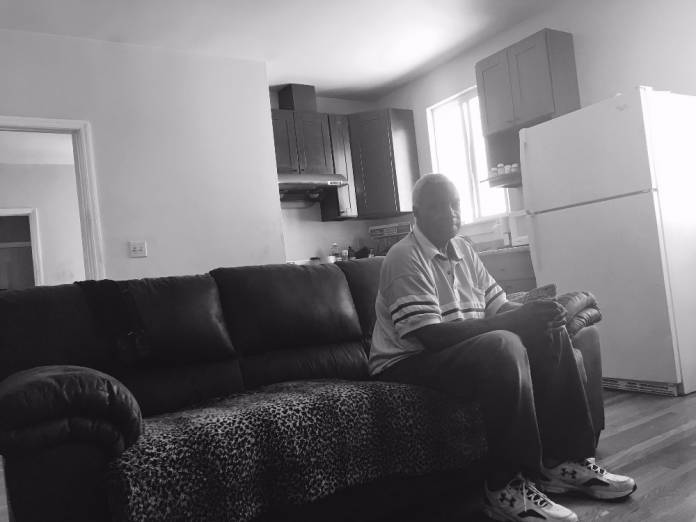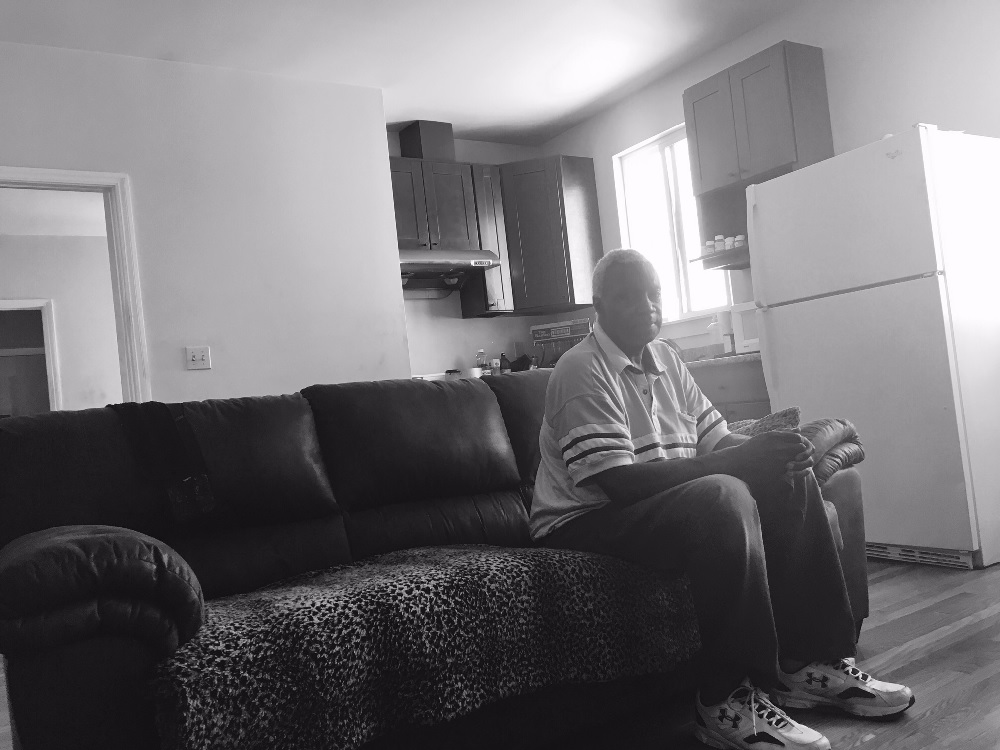
The Bayview tenants who are facing eviction because a landlord illegally built their units got a reprieve today when the Planning Commission voted unanimously to delay action on the demolition of the apartments.
Sup. Malia Cohen asked the commission for a continuance of an item that could have authorized the demolition of more than 15 rent-controlled apartments housing military vets, most of them seniors and many formerly homeless.

Tommi Avicolli Mecca, an organizer with the Housing Rights Committee, told the commissioners that his group was working with Cohen and the Mayor’s Office of Housing to find a way to keep the tenants from winding up on the streets.
There is at this point no comparable affordable housing for them, he said.

The tenants all have federal housing vouchers, and it’s difficult to find landlords who will take them.
Several of the tenants of buildings owned by Judy Wu, who bought the properties during the foreclosure crisis and converted them – illegally, the city says — from single-family homes into small apartments spoke to the commission.
Every one of them said their homes were in good condition, with kitchens and bathrooms, and that Wu was good about maintenance.
Mecca pointed out that, whatever Wu’s legal problems, “the tenants did nothing wrong. Let me repeat that: The tenants did nothing wrong.”
One tenant said that he shouldn’t have to suffer because a building owner created his apartment without permits and cut a single-family home into more units that the law allows.
“If you want to fine her, then fine her,” he said.
But he, and all of the others, asked that they be allowed to stay.
It’s a tricky situation: The city can’t just allow landlords to violate zoning laws (although we seem to allow Airbnb, Uber, the Google buses, the Academy of Art University, and lots of other big corporations to violate the law with impunity).
But there are people living in what the city calls substandard housing (although the one unit I visited seemed fine, and the Housing Rights Committee says all of the units are entirely habitable).
There have been complaints about parking and trash; Wu needs to deal with the trash problems, and parking in that area (like most of the city) is crazy.
But it seems as if there must be a way to keep formerly homeless seniors who are disabled veterans from losing their homes.

How can you be welcoming to gays when there is no place for them to live
Why does SF pick on a landlord actually providing affordable housing (if it rents for housing voucher limits, it is most definitely affordable1) but gives Uber, tech buses, AirBnB so much leeway? I think comments here missed an important part of this article: landlords are held to local law but the aforementioned tech companies get away with a hella lot.
<p>Do you have a citation for the $23,000 for a house number? The <a href="http://www.sfexaminer.com/bayview-landlord-seeks-remove-unauthorized-housing-veterans-low-income-tenants/">Examiner article</a> says that the most extreme case was $11,830 for a 7-bedroom house in an R-2 zone (including illegal structure in yard).</p><p>She’s not cheating the feds if she is following the federal rules. According to the <a href="http://sf-planning.org/meeting/planning-commission-july-27-2017-agenda-0">planning department</a> (item 16), the units passed the federal HQS inspections. Landlords are allowed to charge up to the legal limit for voucher holders; it is not their responsibility to ensure that the rent they choose matches that of comparable units in the neighborhood. So yes, the rent may be higher than what she could charge to a non-voucher holder, but that is why some landlords are willing to take the hassle of Section 8 inspections and tenants. As far as I have read, there was no deception between her and the federal government.</p><p>Instead, as I said earlier, she violated the local zoning code. It is also the zoning code that limits the number of landlords that can compete against her and offer better housing. The residential density limits in the zoning code were outdated a decade ago at meeting the needs of poorer families, and they are still outdated today (despite recent ADU laws).</p>
The owners are cheating the Feds. Charging maximum rent amounts per person for units that would probably only rent for $5 to 6,000 at market rate. $23,000 for a house?! That is not "affordable housing."
Many do make that choice. If one wants to live in the City it often means accepting less space in a less desirable environment. For low income it may mean substandard or overcrowded living conditions. They are free to make that choice.
Many years ago George Lucas bought an old agricultural processing plant in Modesto with the idea of transferring some of his operations there. His thinking was his employees could afford much nicer homes. However, his most talented employees said they would not move; better a hovel in San Francisco than a mansion in Modesto.
You are free to make that call yourself, Don.
Others should be able to do so as well, and decide differently.
I don't know about should but that is a reasonable alternative. There are cities (counties) in the Bay Area that have good support, sometimes better than SF. Even rich people can't afford San Francisco and move out to find what they desire or consider acceptable. Moving out of the City is not a terrible thing and is often an improvement in one's standard of living. All of my living relatives and most of my childhood friends moved out of the City and are glad they did. There are tradeoffs like public transit but often those tradeoffs are worth it. There are smaller towns or neighborhoods in larger towns where you can walk to many services.
Don: and they also have lower wages, inferior public transit systems, and less support (through official or unofficial channels.)
I really can't stand the "poor people should just move because rich people want their home" argument.
One nice thing about SF is its diversity of neighborhoods offering a variety of lifestyles. I would not like to see homogenized cookie cutter neighborhoods. Lower density single-family owner-occupied neighborhoods provide needed housing for families with school age children. And most people, around 70% prefer lower to higher density living. The same thing can be said about counties. Sonoma should not look like San Francisco. However, I suppose SF could stop further development until other cities in the Bay Area have equal density.
I am not clear on the concept of workforce housing or what that means. The number of housing units should equal the number of workers? But even there, workers might not choose to live where they work. Over 40 percent of those who live in SF, leave the City to get to work.
The exact same argument can be made for the homeless people living in tents. Where they're living is illegal. But if they are displaced, where will they go? In this instance the landlord is receiving $23,000 a month for one of her SFH's. the financial incentives are huge. As perspective, the Tenderloin wasn't always a high crime dilapidated area. It became that way, over time, as economic downturns ocurred and the percentage of low income residents increased. The solution to having cycles of construction, depreciation, dilapidation, slum, and re-gentrification is to not promote stratification of income levels in neighborhoods. That takes continuous effort because the "natural" process is for financial predators, like this landlord, to take advantage of economic downturns and crises which inevitably will occur.
Many people are being displaced and/or given vouchers which will not be useable in SF or outlying cities. Urban as well as suburban communities all need to absorb equitable density and build adequate mass transit connectivity. When you dive to the valley and hills in CA there are many areas devoid of real planning of housing density and mass transit solutions. You cannot solve it all immediately or overnight but corporations must do better to develop and create workforce housing. It occurred in the industrial revolution and post ww2 and we need a similar effort environmentally and socially today…
That need does not need to be met in San Francisco. What would be the greater good?
It depends if legalizing these units will have a negative impact on others who live nearby. There are often good reasons for zoning laws.
Zoning laws should be enforced. If it is difficult to find places in San Francisco that will accept Federal housing vouchers, why not explore other areas in the Bay Area or California where those vouchers will be accepted. Those areas probably also have a lower cost of living that could improve their standard of living.
<blockquote>It’s a tricky situation: The city can’t just allow landlords to violate zoning laws</blockquote><p>There are probably thousands of illegal ADUs in district 10 and district 11. These Asian ladies who provided affordable housing in protest of our maximum residential density rules in the zoning code were right all along, and the law is finally starting to come around to their side. Note that if this had been completed before <a href="https://leginfo.legislature.ca.gov/faces/billNavClient.xhtml?bill_id=201520160SB1069">SB-1069</a> and <a href="http://sfbos.org/sites/default/files/o0095-17.pdf">Peskin’s June 2017 law</a>, then we would be talking about a loss of 25 units, not 15. If this had happened before the <a href="http://sfbos.org/ftp/uploadedfiles/bdsupvrs/ordinances14/o0043-14.pdf">2014 unit legalization law</a>, then it would have been a loss of 29 units. The law should be amended further to allow 0 units to be lost instead of 15.<p>And by “unit” the zoning code is actually regulating sinks, stoves, and doors, not bedrooms! To some tenants it may not make a big difference if the planning department demands a “wet bar” and hot plate instead of a kitchen counter and oven, but it may be effective at making the space invalid and unaffordable for federal voucher holders.
Yes, because those in red states have been so welcoming to gays, Obama, Clinton, etc.
I take the pragmatic route: shes solving a problem for these people, who would likely otherwise be homeless. Their rent checks are rightfully being cashed by her in exchange for providing a service these vets and the US government feel is valuable. If there is a sucker in this situation, I'd say it is the rest of us for not thinking of it first. Maybe if we allowed the division of a more SFHs we could get house more people who are currently in precarious situations.
However, the 'unintended consequence' of such an action is that it takes a single family house and turns it into a multifamily bldg. I'll bet the income stream from the later is way more than the income stream from the SFH. And of course, another 'unintended consequence' is that the actual value of the property may well be less than as a SFH.
Ms Wu however got the bldg at a 'foreclosure-sale' price – so, looks like its all gravy for her. Notice the hidden hand of the Govmint; Ms Wu is effectively farming the property for housing subsidies as sure a Con-Agra does to not plant corn. Rube Goldberg indeed.
I'm not sure whether to salute her or shame her.
Interesting how property values and housing prices are always higher in the liberal blue states isn't it
We have laws and a government to protect us. Who is the government protecting through enforcing these laws? Think about how many more homeless vets could be housed if we legalized what this landlord is doing illegally.
and here we have a nice example of "San Francisco values"
Take your libertarian nonsense to a red state.
The city allows many large corporations to break the law claiming its hands are tied. There is no reason to give corporations a better deal than a small landlord.
ADUs
"It’s a tricky situation: The city can’t just allow landlords to violate zoning laws"
Why not? If homes that are safe and habitable can be provided for these people why should the zoning laws force these tenants to be homeless?
All the big companies need to step up to the plate and tackle housing at essential and lower income levels. It's called philanthropy and it's needed across the board on housing.
Met-Life built Parkmerced for WW2 vets and desperately needed housing. Why can we not gather enough good will and inventive solutions to build and protect a larger chunk of housing for the greater good? Maybe it's not one site but purchased and dispersed in all districts. There needs to be an aggressive plan acceptable to all neighborhoods that "x" number of units will be built spread equitably in all neighborhoods
Think harder on the issue its not rocket science…. It's basic human needs…